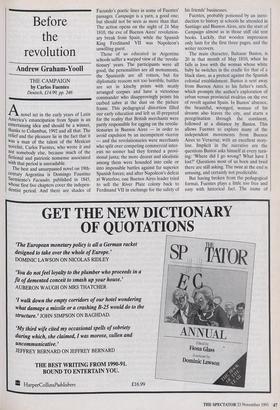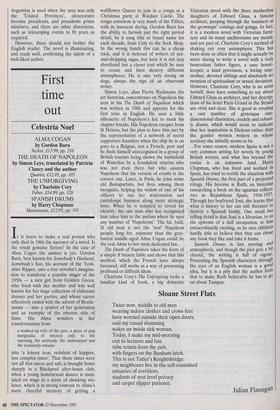Before the revolution
Andrew Graham-Yooll
THE CAMPAIGN by Carlos Fuentes Deutsch, £14.99, pp. 246 Anovel set in the early years of Latin America's emancipation from Spain is an entertaining idea and should be a winner, thanks to Columbus, 1992 and all that. The relief and the pleasure lie in the fact that it was a man of the talent of the Mexican novelist, Carlos Fuentes, who wrote it and not somebody else, because much of the fictional and patriotic nonsense associated with that period is unreadable.
The best and unsurpassed novel on 19th- century Argentina is Domingo Faustino Sarmiento's Facundo, published in 1845, Whose first five chapters cover the indepen- dentist period. And there are shades of Facundo's poetic lines in some of Fuentes' passages. Campaign is a yarn, a good one; but should not be seen as more than that. The action opens on the night of 24 May 1810, the eve of Buenos Aires' revolution- ary break from Spain, while the Spanish King Ferdinand VII was Napoleon's unwilling guest.
Those of us educated in Argentine schools suffer a warped view of the 'revolu- tionary' years. The participants were all good, the personalities are all monuments, the Spaniards are all rotters, but for diplomatic reasons not too horrible, battles are set in kitschy prints with neatly arranged corpses and have a victorious commander who disapprovingly points his curbed sabre at the dust on the picture frame. This pedagogical distortion filled our early education and left us ill-prepared for the reality that British merchants were partly responsible for egging on the revolu- tionaries in Buenos Aires — in order to avoid expulsion by an incompetent viceroy — and the revolutionaries were merchants who split over competing commercial inter- ests no sooner had they formed a provi- sional junta; the more decent and idealistic among them were hounded into exile or into impossible battles against far superior Spanish forces; and after Napoleon's defeat at Waterloo, one Buenos Aires leader tried to sell the River Plate colony back to Ferdinand VII in exchange for the safety of his friends' businesses.
Fuentes, probably poisoned by an intro- duction to history at schools he attended in Santiago and Buenos Aires, sets the start of Campaign almost as in those stiff old text books. Luckily, that wooden impression only lasts for the first three pages, and the writer recovers.
The main character, Baltasar Bustos, is 20 in that month of May 1810, when he falls in love with the woman whose white baby he switches in the cradle for that of a black slave, as a protest against the Spanish colonial establishment. Bustos is sent away from Buenos Aires to his father's ranch, which prompts the author's exploration of urban versus provincial rivalries on the eve of revolt against Spain. In Bustos' absence, the beautiful, wronged, woman of his dreams also leaves the city, and starts a peregrination through the continent, followed at a distance by Bustos. This allows Fuentes to explore many of the independent movements from Buenos Aires to Veracruz, with an excellent story- line. Implicit in the narrative are the questions Bustos asks himself at every turn- ing: 'Where did I go wrong? What have I lost?' Questions most of us born and bred there are still asking. The twist at the end is amusing, and certainly not predictable.
But having broken from the pedagogical format, Fuentes plays a little too free and easy with historical fact. The name of Argentina is used when the area was only the 'United Provinces', directorates become presidents, and presidents prime ministers, and there are other distortions, such as telescoping events to fit years as required.
However, these should not bother the English reader. The novel is illuminating, and reads well, confirming the talent of a well-liked author.









































































 Previous page
Previous page